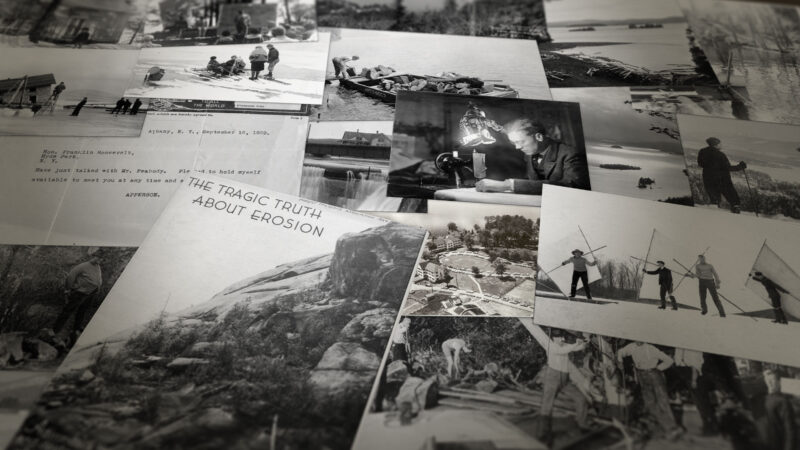- September 2, 1923 – Sylvia Loines to Editor, Post-Star, Glens Falls –
Dear Sir:
It is easy to be seen that you did not have a representative at the meeting of the Lake George Association on Friday, or you could never have used the [?] innocuous article that appeared in your Saturday columns to portray what took place there. It was, as it were, a portrait with the features completely wiped out.
It is unfortunate that there was not a court stenographer present. I for one would like to have a copy of the proceedings. Is it too late for you to give the public a fair and accurate account of what actually took place instead of such a collection of meaningless nothings as “Several different opinions expressed by various members of the Association,” and “all phases of the questions of exact benefits…was brought up.” And last but not least, obtuse space filler: “Just what land may be bought by the state and what was meant by the Tongue Mountain tract were questions asked, and explained by chart.”
Why not, Mr. Editor, simply have summed up the whole affair: “A good time was had by all.” Then there would have been more room for a nice little murder story, or whatever constructive trifles the newspaper of today likes to fill its columns with.
Seriously, was there no News Value in giving the original reverse resolution to the one finally passed? A resolution read in a rush before two thirds of the attendants at the meeting had arrived; and read by a Mr. Hayden on the park bill as being one of the men “who made Lake George when it was the wilderness I wish to God it was now,” …his exact words. Is it not news to tell that so fine a philanthropist as Mr. Bixby stated that he would resign from the Association if any such resolution should be passed at that meeting? That a man of the big-heartedness and fine caliber of George Foster Peabody stood up after all the pygmies has expressed their limited little views on their desire to “keep their land for themselves” and, with no thought or sign of a “holier than thou” attitude, gently rebuked self interest and held out the standard of a larger vision of the greatest good to the greatest number.
It should be news value, too, to hear that so much poison gas had been used by the enemies of the state and of state-ownership that two or more distinguished guests and speakers of the meeting were subjected to both discourtesy and insult by a majority of this gathering of otherwise well-bred people. There was heckling, and on one occasion hissing, and indescribably rude interruption by an elderly Victorian dame who objected to the campers bathing “in the nude.”
The significant thing to a shrewd observer was the fact that these tactics were all on one side, as were also the giving of the lie on three separate occasions by misinformed though possibly well-meaning people, including young Mr. Knapp, who appears to take the whole effort of the conservation of Lake George as a personal attack upon himself.
The fact that even such a poor attempt at a resolution favoring conservation should have been passed at that meeting and the air partially cleared of poison gas and propaganda is proof indeed that “they that be for us are more than they that be against us,” and that in spite of the paid agents of our opponents still actively using German methods, so extensively employed during the war by the Bureau of Enemy Psychology, if you are on the side of the right: “No weapon that is formed against you can prosper.”
Sincerely yours,
Sylvia Loines
